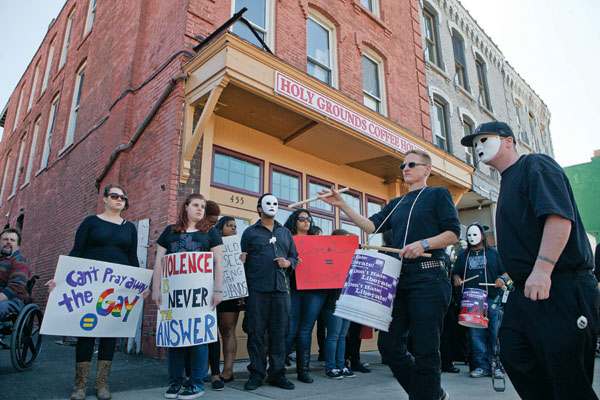Scott Lively: The Crusader

An anti-Lively protest outside of Holy Grounds.
Encouraged by the response to his essay, Lively decided to write a book on the subject, The Pink Swastika, published with coauthor Kevin Abrams in 1995. “While we cannot say that homosexuals caused the Holocaust,” they wrote, “we must not ignore their central role in Nazism. To the myth of the ‘pink triangle’—the notion that all homosexuals in Nazi Germany were persecuted—we must respond with the reality of the ‘pink swastika.’”
Lively was well aware of what publishing The Pink Swastika would mean for him. “I knew when I sat down to write that book,” he told me, “that if I crossed this line and actually published this, that I’m sort of sacrificing any future I could have in the mainstream world, because it’s so radical and will bring such incredible hostility…. At the same time, I had a sense of being self-sacrificing.”
And, indeed, Lively has been vilified for writing the book. Citing it, for example, the Southern Poverty Law Center has added Lively’s Abiding Truth Ministries, which he founded in 1997, to its list of hate groups. But the book found its audience, as Lively knew it would. Now in its fifth edition, it has been printed in five languages and has become a popular manifesto in the anti-gay movement. “The Pink Swastika is a landmark book,” says Bryan Fischer, the host of Focal Point, a conservative radio show that reaches roughly a million people each week. “I feel it [contains] a message that needs to be disseminated. If it was not an influential book, it would simply be ignored. Instead, the Left rails against it. And that alone is a sign of the enormous influence he’s had on the public debate over homosexuality.”
Around the time the book came out, Lively left Oregon and moved to California, where he not only launched Abiding Truth Ministries, which he claims is one of the first Christian organizations devoted exclusively to opposing homosexuality, but also went to law school. After becoming a lawyer, he began to travel abroad, preaching his anti-gay message, and in 2002 made his first trip to Uganda. He broke into Eastern Europe in 2006, he says, when he was invited to speak about the “gay agenda” at a conference in Riga, Latvia, hosted by the New Generation Church, a global evangelical ministry based in the city. The following year he visited Lithuania, where he began to make his political influence felt. Rimvydas Baltaduonis, of the Tolerant Youth Association in Lithuania, says that prior to Lively’s visit, nobody in the country was talking about the “threat” of homosexuality. Then Lively showed up, announcing, as he himself would later put it, that “discrimination against homosexual behavior is necessary.” During that period, a censorship bill aimed at keeping information about homosexuality away from children was introduced into Parliament. The bill passed in 2009, despite a presidential veto.
This past fall, curious about what Lively had been up to since his Uganda trip, I reached out to him. Wary of the media, he nevertheless agreed to talk, and invited me to come meet him in Springfield. I paid him a series of visits, during which he spoke to me openly about his past, his beliefs, and his ambitions. Despite the aggressive posture he often adopts publicly, I found him to be easygoing and affable. As we talked, however, he stuck firmly to his controversial beliefs. When we parted, he forgave me in advance for what I might say about him.
Unlike many evangelicals who oppose homosexuality, Lively has no interest in softening his rhetoric or scaling back his activism in response to the remarkable shift in public opinion toward the acceptance of gays that this country has witnessed during the past decade. When I mentioned that his views might offend or hurt people, he expressed no sympathy. “Grow up,” he responded. “Get over it.”
This kind of attitude, not to mention the negative media attention he has received, only makes Lively more of a champion to those on the anti-gay fringe, who admire his willingness to stand up and act in the name of his beliefs. “To us,” says Bryan Fischer, the conservative radio host, “Scott Lively is a hero. He’s shown courage, he’s shown bravery, and he’s refused to retreat in the face of hostile fire. He is the homosexual lobby’s number-one target. And he is an inspiration.”
Lively told me that after he returned to Springfield he decided to pay no attention to his critics. But then came the lawsuit filed by Sexual Minorities Uganda. “I was shocked,” he told me. “Crimes against humanity? Are they crazy?”
Outraged by the move, and by how he’s been treated in the press, he said he’s now decided to fight back. “The lawsuit was the final straw that called me out,” he told me. “I was ignoring everything, but when they did this, it shows they’ll do whatever it takes to shut me up. So they’ve called me out, and it’s high noon. So I’m back out on the street to have a showdown. Twenty-thirteen is the beginning of renewed activism on my part, and I’m going to start organizing people in this state.”
Not only that, he’s exploring a run for governor.


